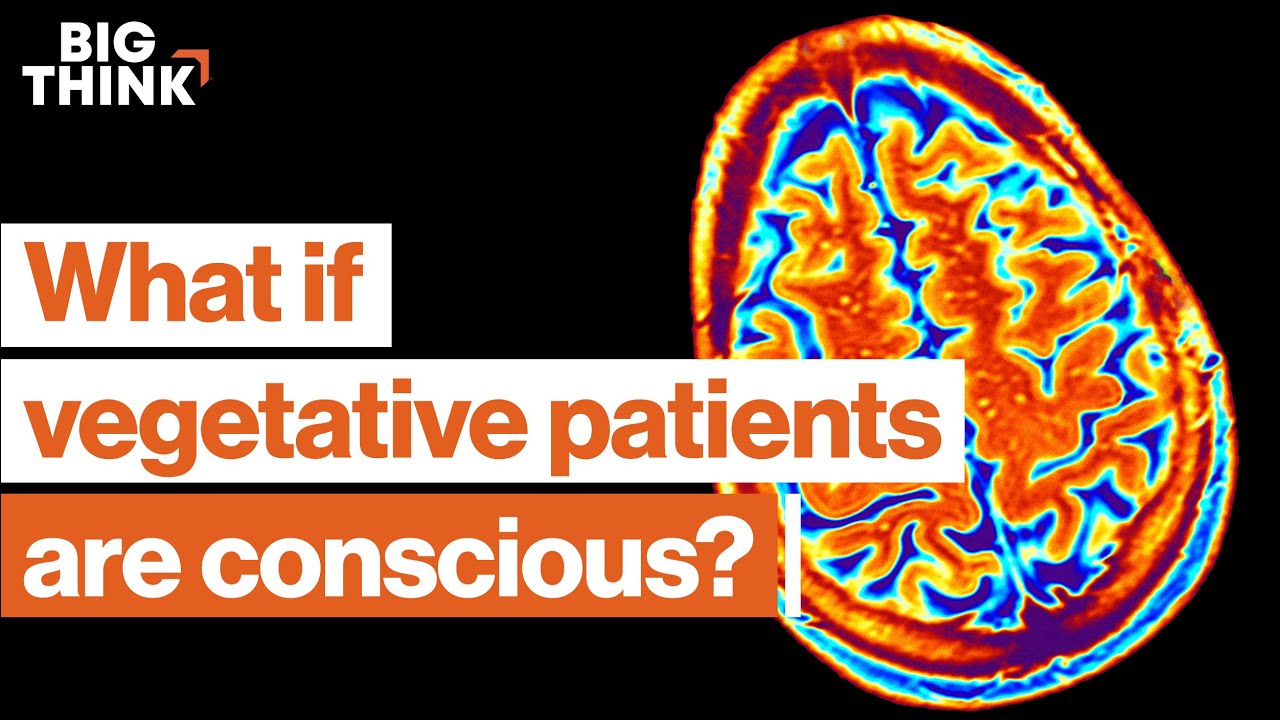Big Think
Big Think x Freethink
At Big Think, we share actionable lessons from the world’s greatest thinkers and doers. This week, we’re partnering with Freethink to bring you amazing stories of the people and technologies that are shaping our future, from neuroscience breakthroughs to bionics and justice. Catch Freethink’s documentary-style videos right here on our channel this Monday, Wednesday, and Friday.
———————————————————————————-
What if vegetative patients are conscious? Neuroscientist Adrian Owen, author of Into The Gray Zone and a professor at Western University in Canada, is using fMRI technology to try to reach the people who may still be aware of their surroundings.
Consciousness has traditionally been assessed by asking patients to respond to verbal commands. Through brain imaging, Dr Owen and his team were able to prove that these tests are inadequate, and it’s estimated that 20 percent of vegetative patients are conscious but are physically incapable of communicating it.
“Communication is the thing that really makes us human,” says Dr. Owen. “If we can give these patients back the ability to make decisions, I think we can give them back a little piece of their humanity.”
———————————————————————————-
DR ADRIAN OWEN:
Dr Adrian Owen is a Professor at The Brain and Mind Institute, Western University, Canada and the former Canada Excellence Research Chair in Cognitive Neuroscience and Imaging. His research combines neuroimaging (MRI and EEG), with cognitive studies in brain-injured patients and healthy participants. He has spent the last twenty years pioneering breakthroughs in cognitive neuroscience. Find out more at OwenLab.uwo.ca.
Check his latest book Into the Gray Zone: A Neuroscientist Explores the Mysteries of the Brain and the Border Between Life and Death at https://amzn.to/3le2QPX
———————————————————————————-
TRANSCRIPT:
DR. ADRIAN OWEN: Imagine this scenario. You’ve unfortunately had a terrible accident. You’re lying in a hospital bed and you’re aware—you’re aware but you’re unable to respond, but the doctors and your relatives don’t know that. You have to lie there, listening to them deciding whether to let you live or die. I can think of nothing more terrifying.
I’m Dr. Adrian Owen. I’m the author of ‘Into the Gray Zone’, a neuroscientist explores the border between life and death.
Communication is at the very heart of what makes us human. It’s the basis of everything. What we’re doing is we’re returning the ability to communicate to some patients who seem to have lost that forever. The vegetative state is often referred to as a state of wakefulness without awareness. Patients open their eyes, they’ll just gaze around the room. They’ll have sleeping and waking cycles, but they never show any evidence of having any awareness.
So, typically, the way that we assess consciousness is through command following. We ask somebody to do something, say, squeeze our hand, and if they do it, you know that they’re conscious. The problem in the vegetative state is that these patients by definition can produce no movements. And the question I asked is, well, could somebody command follow with their brain? It was that idea that pushed us into a new realm of understanding this patient population. When a part of your brain is involved in generating a thought or performing an action, it burns energy in the form of glucose, and it’s replenished through blood flow. As blood flows to that part of the brain, we’re able to see that with the fMRI scanner.
I think one of the key insights was the realization that we could simply get somebody to lie in the scanner and imagine something and, based on the pattern of brain activity, we will be able to work out what it is they were thinking. We had to find something that produces really a quite distinct pattern of activity that was more or less the same for everybody. So, we came up with two tasks. One task, imagine playing tennis, produces activity in the premotor cortex in almost every healthy person we tried this in. A different task, thinking about moving from room to room in your house, produces an entirely different pattern of brain activity; particularly, it involves a part of the brain known as the parahippocampal gyrus. And again, it’s very consistent across different people.
So, we realized that we could use this as a simple mechanism for asking yes or no questions. We could say, well, I’m going to ask you a question. If the answer is yes, imagine playing tennis. If the answer is no, imagine thinking about moving through the rooms of your home. I can still remember exactly what it felt like the first time we saw a patient that we thought was in a vegetative state activate their brain…
Read the full transcript at https://bigthink.com/videos/neuroscience-vegetative-consciousness
Source




What other scientific breakthroughs have given you hope lately?
Wow scary
Consciousness in coma____panik
You're not in coma. ____kalm
I have sleep apnea. ____panik
My dad has been like this for 3 years, sometimes I see tears running from his eyes,… he cries
This happened to me when I was 13 years old. In 1995 I was diagnosed with acute lymphocytic leukemia. I underwent massive chemotherapy treatments one of which was intrathecal methotrexate. The methotrexate eventually started to attack my brain and threw me into a vegetative state. I was aware but trapped in my body. I would just sit there crying and crying because of how scary it was to not be able to communicate.I started to slip deeper and deeper into a coma and my doctors have lost all hope at that point. I went to a dark peaceful void that was filled with love and warmth. When I woke I saw my entire family standing around my bed saying goodbye to me. At this point the doctor said I was either going to die or never wake up. I even had my last rites. Upon waking up I could feel how scared everybody was. I kept saying to everybody (in my head bc I couldn’t speak) “it’s OK guys I’m gonna be OK”…Sure enough I pulled out of it and made a full recovery which stunned doctors. I am now a pediatric reiki nurse and a mother of a beautiful 4 1/2 year old. I always looked at how lucky I was to survive some thing that nobody thought I would. God had other plans for me. Life truly is beautiful to me because I truly did get a major second chance…Live each day like it’s your last because it could be.♥️
Thank God for all these scientists!
If they're in a vegetative state and still conscious,one of the 1st questions they should ask is,"do you want to live or die". Because there's absolutely no way I'd want to continue living in that horrendous state.
I came to look about this,Prichard Digget Colon great boxer
Amazing….PVS, coma, brain death
This reminds me of when i’m in sleep paralysis but this is way scarier
Rip dmx
This what's going on with DMX right now. ..
Yeah at that point, even if I was conscious, I'd rather die.
20% are living in absolute hell. Very disturbing and immensely scary!
Imagine all those poor people that was completely aware they were coming off life support and about to die…
👋 Try and fail, but don't fail to try. My top entrepreneur @evenkingsfall (his insta) always stresses you have to THINK BIG to WIN BIG! Always keep that energy! Looking forward to your next video 🖤
So Terry Schivo was killed when conscious
Underated
"I have no mouth but i must scream"
Bro….. this shit is insane.
Amazing..
I'm glad to see someone actually doing this. I have been concerned about this for a very long time with regards to organ harvesting. So much so that I actually asked the organ donation registry if I could put a condition on a donor status that would require a neural skin before I could be harvested and I was shocked to learn that this would not be possible. The only way to maintain my rights would be for a living will to stipulate this and to not be in an organ donor registry because in this case my next of kin would have the right to declare such things whereas if I'm declared to be in a vegetative state I'm supposedly brain dead and therefore have no rights as a dead person .
It seems evident to me that if even a single person wakes up on the organ donation table, or wakes up because the family decided not donate organs that someone someone somewhere must have been harvested alive. Ripped apart piece by piece without regard for the experience of the person being harvested.
I remember reading reports about an elevated heart rate indicating an emotional stress response being ignored because this was seen as a purely physiological thing. No, if there's a heartbeat it's being controlled by the brain. The heart is deciding to increase the heart rate in response to what is being experienced. That's horrible!
Yes, we have a need for organs, but we also need to trust the organs will only be harvested from those who are truly dead. Otherwise it's murder. So I really hope that your process, or something resembling your process becomes part of the standard procedure for determining brain death. Because otherwise there is no way I will ever donate my organs and I would like my organs to be abused to someone in the event that I am truly dead but I don't want to experience being ripped apart into pieces while I am conscious of it. I don't want to experience that kind of nightmare, and I don't think that's a selfish desire.
This video style is better than the usual 👏👏
I was in a vegetative coma when I was 19. My parents were told I would never come out of it. They were told to take me off machines, which I wanted. But they wouldn’t agree. I was looking down on everything happening to me, and listening very clearly to everything being said, from the ceiling. I just wanted to be let go to the peace just beyond my reach, and leave the pain of my body behind. I remember hearing people adjusting equipment. One said what a waste of time and money I was. “She’s just a pin cushion. Nobody home.”
Next : We can communicate with ghosts and jesus
Thank you sir 🙏🙏🙏
A few years back a young man who had been in a vegitive state who made a full recovery… he told that his mother at his bedside had told him he should die. That everyone would be better off. Im sure she was thinking out loud and didn't belive he could hear or that he would ever recover. Surprise!!!! Remember that cruel shit you said? I do….
1 in 5 is conscious? Damn, that's only slightly lower than the rate in Congress.
That's both terrifying in the sense of the shear numbers of people throughout the years that must have been absolutely alone and scared. But this is also amazingly hopeful and fantastic in scope, the amount of suffering and human emotional pain that this may prevent in the near future and beyond gave me a real sense that the human race isn't completely lost. Great story
Unfortunately, there is currently no practical application for this research: that conscious "vegetative" patient remains trapped in a dysfunctional body with no way to communicate with his/her environment, apart from an MRI scanner. I'm not sure I'd want to know if my loved one were that 1 in 5 and consider him/her a soul locked into a nutshell.
1 in 5 isn't very compelling. Unless you can reverse their damage you still have to consider letting them go.
If I can't interact with the world than clearly I need to be let go.
For myself, if I'm in a conscious state but with no means to project that to the people and professionals surrounding me. Consequently, its the same as being in a coma or a vegetative condition. Based on that I would rather they pull all plugs as that condition of life is not worth living.
Absolutely beautiful my friend
What if you were reincarnated and you became a cactus
Sounds like sleep paralysis but on a massive scale 😶
Thinking as sign language sounds terrible. Imagine having to think about whatever thoughts will show up on an FMRI to express some other thought. Who could keep track of their own train of thought in the process? I don't share the researcher's optimism.
Thank God for this work.
brought me to the verge of tears
Several weeks earlier I had this thought in my mind that whether this is possible or not and now I am seeing this video and I'm amazed that this already happened.
It's amazing 👏
Would be wonderful to think that a new language like sign language, but using imagined images could be developed so these people could communicate with loved ones and also be able express themselves and continue to develop intellectually. Idea would be they could wear a cap and software would then convert their thoughts into a spoken language.
Is there any way to keep updated on this specific problem and the solutions? I would like to keep up with it, but I don't know how
I often think about and cannot believe that we live in a society where $TRILLIONS are spent on the military EACH AND EVERY YEAR. Who is the cosmic evil force we’re fighting? If half of that amount would have been poured on science, technology and ethics we would be living in Eden right now. Even the lives of billionaires would have been a dozen times richer, safer, healthier and a quite a little bit longer.
I remember hearing the nightmarish accounts of a person who recovered, saying how gruesome it was to be fed hot soup by ignorant nurses, to be manipulated without any care for the joints, to be absolutely confined, to hear his mother talk out loud begging for him to die so that everyone’s struggle and suffering ends. I’m so sorry!
This sounds amazing but what about people that haven't played tennis don't navigate their house in the "mainstream" way (they could live in a compact apartment, be blind, be in a wheelchair or something else IDK). Couldn't you have just selected some more universal activities like exercising or navigating a building/city instead? I've never played tennis for example.
👍
I believe that if they could create a virtual avatar that could interact with us THAT would be really awesome.
Further ahead, a VR simulation where we could also enter and interact with whoever is comatose would also be really cool.